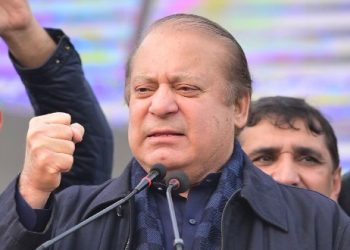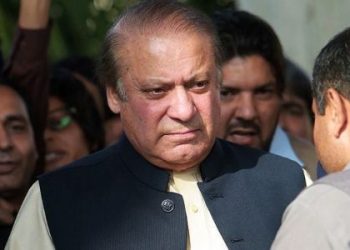LAHROE: Nawaz Sharif, President of the Pakistan Muslim League-Nawaz (PML-N), urged the administration led by Prime Minister Shehbaz Sharif on Saturday to implement comprehensive measures aimed at alleviating the burden of inflation on the public.
He emphasized that the current situation has made it exceedingly difficult for everyone to afford their electricity bills.
Criticizing the decisions of the previous rulers, he said that the country “is not being treated well despite having achieved development goals and freed itself from the International Monetary Fund (IMF).”
“Justice is offered to a man roaming in the street,” said Nawaz, who stepped down as prime minister in 2017 after the Supreme Court disqualified him for not declaring a receivable salary.
“What is the need for such decisions that increased the sufferings of this country?” the former premier questioned, lamenting that the country was successfully achieving milestones of development and prosperity before his ouster from power.
“Electricity bills are not just a problem for poor people; they have become a problem for everyone,” said Nawaz Sharif.
He made the statement while chairing a high-level session alongside Punjab Chief Minister Maryam Nawaz to review matters related to the CM Solar Panel Scheme 2024 in Lahore today.
“Electricity bills have become a trouble for everyone […] not just for poor people but for everyone,” he added. The PML-N president claimed that his government “eliminated loadshedding and controlled electricity rates.”
He also took credit for maintaining a low inflation rate and a stable currency, as well as “getting rid of the IMF” program, but all positive efforts went in vain after the regime change in 2018. “All of us know well who brought the IMF back to this country,” he said.
“The decision-makers must now think and care about our people,” he insisted.
He issued directives to the government to take all possible steps to provide relief to the masses.
Nawaz’s statement came after cash-strapped Pakistan and the global lender reached a three-year, $7 billion bailout program “endorsed by the federal and provincial governments,” the Washington-based institution announced last week.
Regarding the new loan, PM Shehbaz, in his address to the nation, pledged that this bailout package with the global lender will be the last in the country’s history.
The new program, which needs to be validated by the IMF’s Executive Board, should enable Pakistan to “cement macroeconomic stability and create conditions for stronger, more inclusive, and resilient growth,” according to a statement issued by the global lender.
Tough measures in line with the IMF conditions, such as raising taxes on agricultural incomes and increasing electricity prices, have prompted concerns about poor and middle-class Pakistanis grappling with rising inflation and the prospect of higher taxes.














